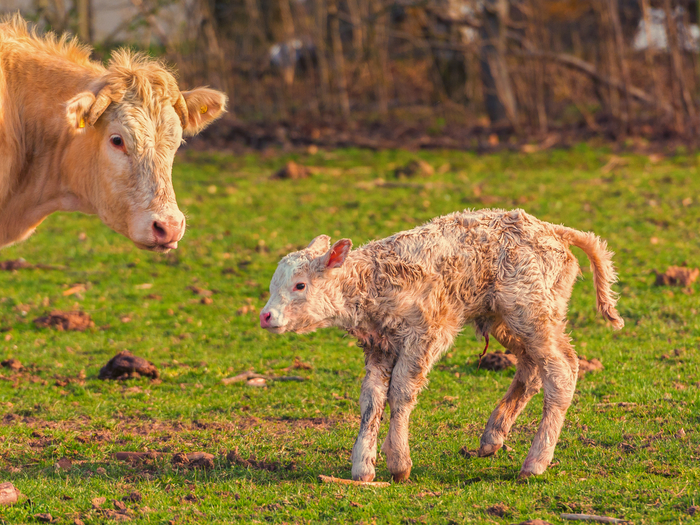UK cattle, sheep and pig sectors are teaming up during February to promote the ‘liquid gold’ properties of colostrum in reducing the need for antibiotics in farm animals and improving their lifetime performance.
The #ColostrumIsGold campaign, created by the Responsible Use of Medicines in Agriculture (RUMA) Alliance, will underline that responsible use of antibiotics starts with newborn calves, lambs and piglets receiving the right amount of colostrum within a couple of hours of birth – something all farmers have the potential to achieve.
A wide range of organisations will be releasing information and promoting best practice throughout the month, mainly based around getting the 3Qs – ‘quality, quantity and quickness’ – of colostrum delivery right.
The FarmAntibiotics.org information website will be signposting to these resources, as well as highlighting hints and tips for more effective colostrum management.
RUMA chairman Gwyn Jones says that as a farmer, he recognises the pressures at lambing and calving, and just how easy it can be to take shortcuts with the all-important first feed.
“But it was a wake-up call when I found out calves receiving insufficient colostrum at birth are more than twice as likely to develop respiratory disease, and can have mortality rates as high as 13%,” he says.
“Too often we see the animal start to suck or we give it a feed, and don’t think about the actual quantity of colostrum it consumes immediately after birth.
“All these factors have an enormous impact on the levels of antibodies in the bloodstream 24 hours later, and on the subsequent health of the animal and its need for antibiotic treatment during its whole life.
“Better colostrum management is an incredible opportunity – not to ensure better health for the future, but cut antibiotic use and produce a more valuable animal for onward rearing,” he adds.
Research manager Dr Jenny Gibbons from AHDB says their recent ‘Calf to Calving’ campaign focusing on youngstock rearing has seen nearly 40% of attendees go on to buy equipment to test the quality of colostrum.
“With recent figures from the Royal Veterinary College indicating just 31% of dairy farmers have been testing the quality of the colostrum before feeding it, this uptake is good news,” says Dr Gibbons.
“Another area to tackle is time of feeding. Only 5% are feeding within the ideal two hours after birth. Changing these practices would make a huge difference to calves for onward beef rearing as well as replacement heifers.”
Specialist sheep vet Dr Fiona Lovatt says lambs receiving insufficient colostrum at birth is behind one of the sheep industry’s biggest antibiotic use ‘hotspots’, in what is otherwise a low-use sector.
“And it’s largely avoidable,” she says. “The reality is that we simply don’t see Watery Mouth in lambs that have taken sufficient colostrum on board in that golden 24-hour window immediately after birth.
Dr Lovatt says a 5kg lamb at birth needs 1 litre of colostrum in its first 24 hours of life to give it essential levels of natural immunity, but importantly, the first feed should be within two hours of birth.
“Antibodies – essential in protecting against all disease including E coli infections – cannot cross through the placenta, so must be transferred through colostrum,” she explains.
“While thin ewes or those that are not well fed in the run-up to lambing will produce too little colostrum of low quality, more often it’s simply not getting enough colostrum into the lamb quickly enough after birth.”
She says the sheep sector should not be relying on use of preventative antibiotics –because of image but also the very real problem of antibiotic resistance. “We know from government data that 50% of neonatal lamb E coli are already resistant to spectinomycin, the most commonly used dose. We need to protect these antibiotics, or we will lose them.”
Veterinary lead at AHDB and pig specialist Dr Mandy Nevel says baby pigs need colostrum too, to maintain body temperature as well as protect them against disease.
She says: “Baby pigs are born wet and with very little energy reserve. Ideally they need to get a feed in within the first 30 minutes to prevent hypothermia. This early feed will also provide essential immunity, giving them the best chance of survival in their first few weeks of life.
“Sow vaccination is the best way to boost antibody levels in the colostrum. That is why piglets who receive good levels of colostrum early will also be the healthiest at weaning. That extra care in the first hours of life will really make a difference.”
Dr Nevel includes post-weaning diarrhoea and respiratory disease as longer term threats for piglets receiving insufficient colostrum at birth. “Colostrum really is a golden opportunity to secure lower antibiotic use and a healthier animal for its whole life.”
Farmers and vets looking for more information should search for the #ColostrumIsGold hashtag on Twitter, or go to the FarmAntibiotics.org website to be signposted to useful tools, resources and case studies from 1 February.


